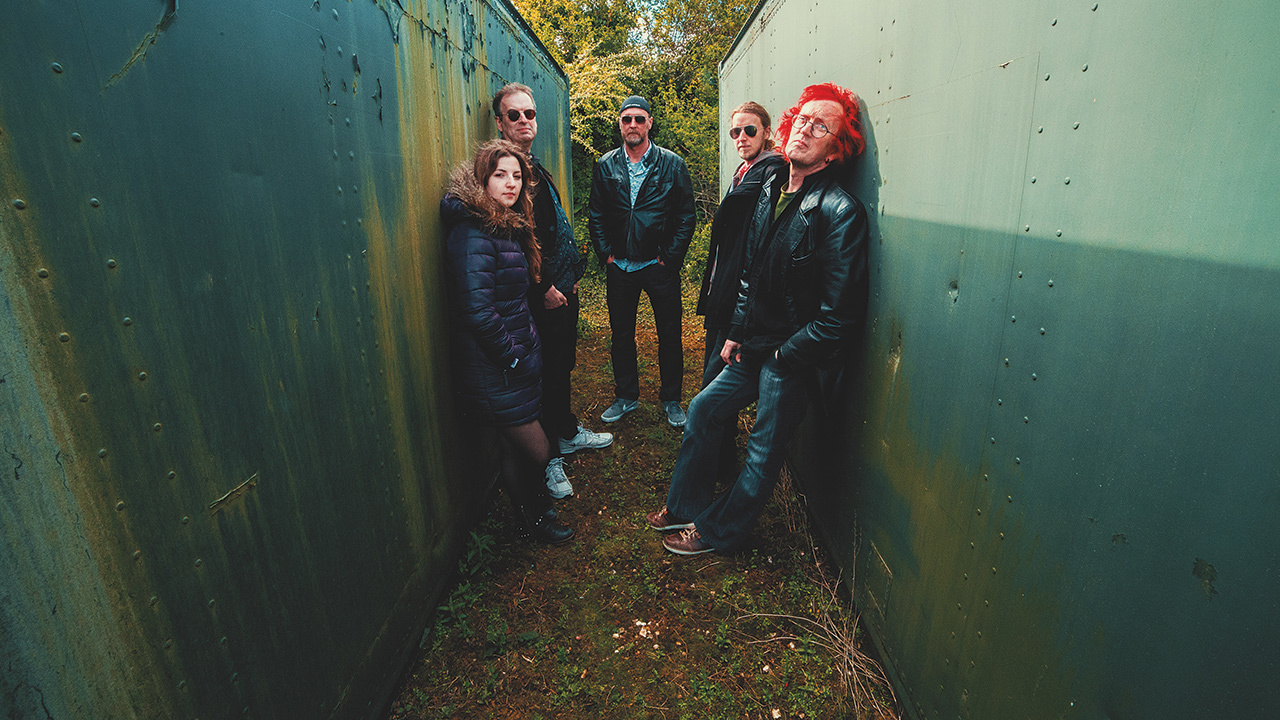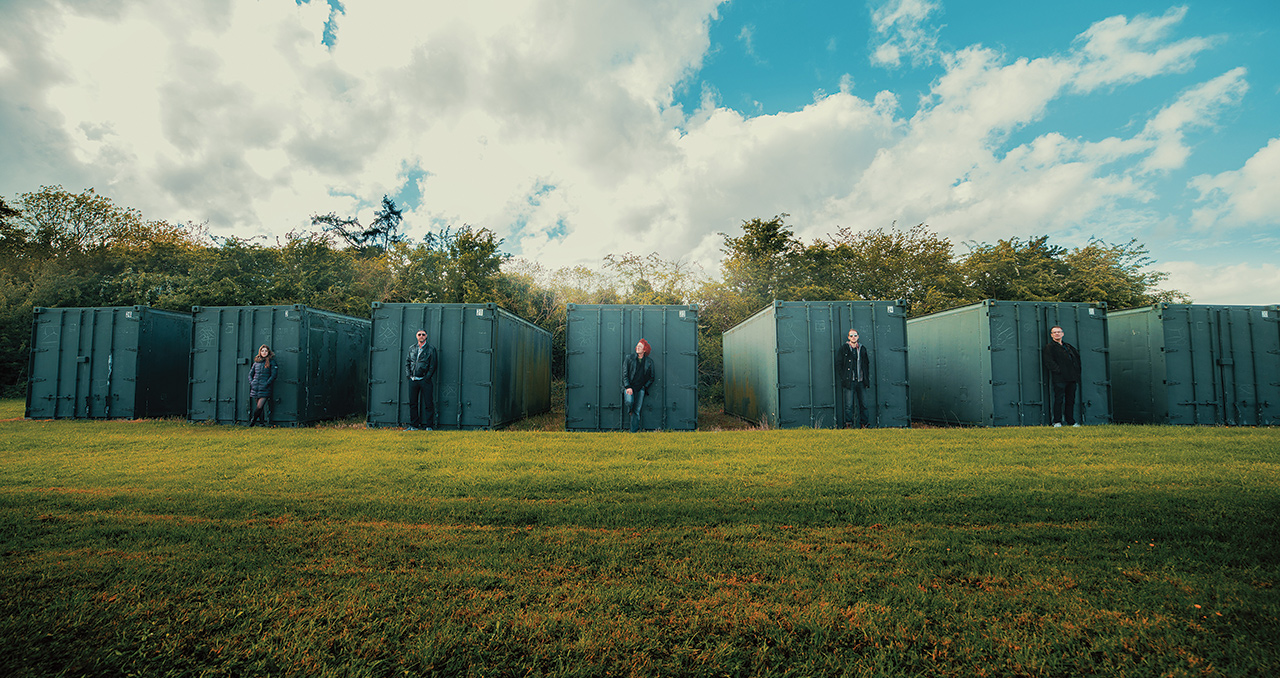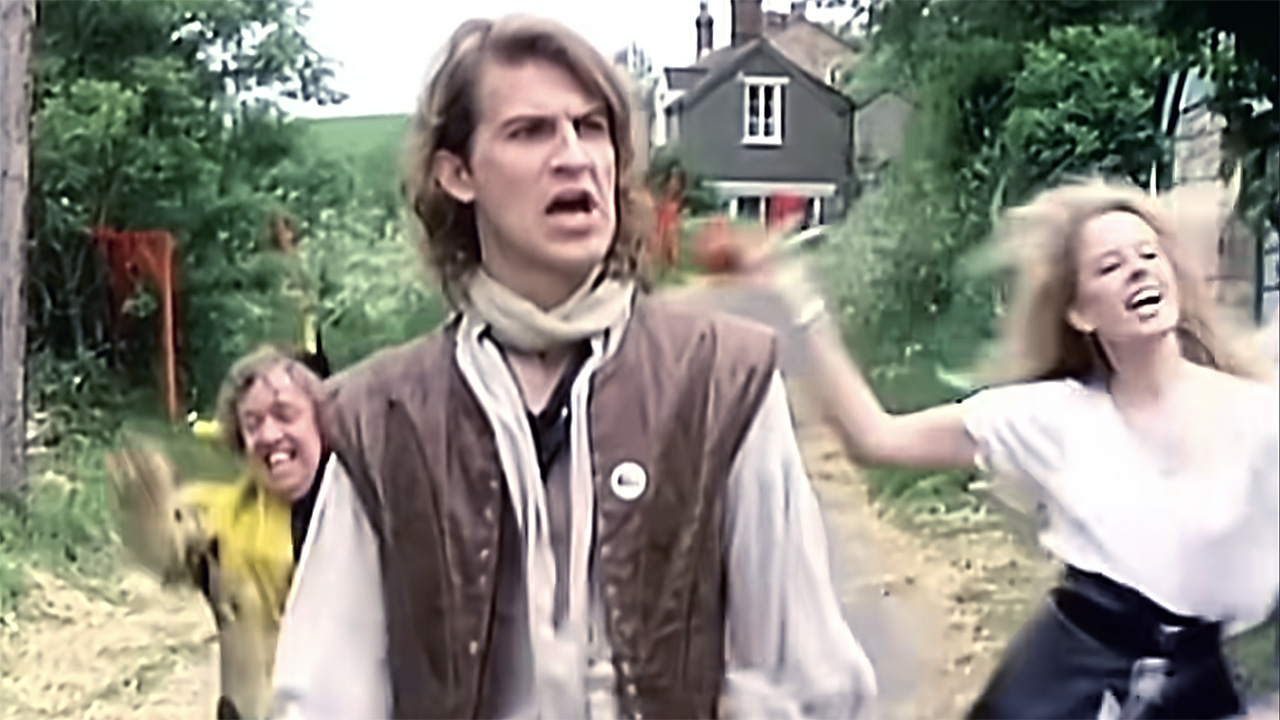The Tangent's Andy Tillison on life and death, punk and prog
After a break from music following a heart attack, Andy Tillison found his prog muse again thanks to the politics and polemics of Brexit. The Tangent man tells us all

They say that what doesn’t kill you makes you stronger. But for a while, Andy Tillison had cause to wonder if that statement always holds true.
“We were doing well,” he says, casting his mind back to the summer of 2015. “The last album [A Spark In The Aether] had just come out, I was feeling pretty positive, and the next thing I knew, I’d had a heart attack and I was in hospital. And it was a big heart attack – this one nearly shut the door. And obviously it came as a shock.”
Tillison had only just celebrated his 56th birthday, and certainly wasn’t expecting to join the ever-expanding line-up of prog musicians who have passed away in recent years. And initially at least, this near-knockout blow drove our hero back into action as soon as humanly possible, as if he’d been reminded of the limited time we all have to express ourselves on this earth.
“I started writing almost immediately,” he says. “In fact, some of the material for this album was first written in the hospital. Sally, my partner, brought my synthesisers into the hospital, and my portable Cubase system, and I started recording there.”
However, once he returned home, his mood changed.
“Soon after I came out of hospital, I found myself distancing myself from it. I thought, ‘I’m not going to listen to any music. I’m not putting any records on.’ You know, I’d sort of gone off music really. I didn’t feel like doing anything.”
Enter, like a knight in shining armour, Mr Steve Hackett… followed by a little-reported nationwide referendum that happened to take place around that time.
Sign up below to get the latest from Prog, plus exclusive special offers, direct to your inbox!
“I was specifically asked to do a song for the Harmony For Elephants record [a charity book/album project released via Kickstarter funding last year], which involved lots of different prog artists doing songs, including Steve Hackett and Anthony Phillips from Genesis. So I wrote a song for that, Two Rope Swings, and I was quite pleased with it. And I thought, ‘Well, if I can write that, maybe I can write some Tangent stuff.’”
The song is a sweetly pastoral joy, built around an alluring acoustic arpeggio. It tells the story of two boys – one in Yorkshire, one in Africa – and their parallel paths through life. It would end up being the opening track of the new album. But before it could take shape as part of the larger piece, Tillison had to rediscover his own self-belief as a songwriter.
“I needed to look for my mojo,” he says. “It was like it had gone off somewhere and I had to go and discover it. I felt like the explorer Henry Morton Stanley going off to look for Dr Livingstone along the Nile, except I was going out looking for the Andy Tillison that writes music.”
His journey of discovery was soon fuelled by the referendum last year, as he found the issues surrounding it stirring his artistic need to say, or do, something… anything.
“Naturally, the Brexit thing and the way people reacted was bound to get me going,” he says, “and that was it – the mojo was back and we made a record.”
The result is The Slow Rust Of Forgotten Machinery, The Tangent’s ninth studio album, which addresses themes both political and personal, immediate and timeless, to an intoxicatingly varied patchwork of tunes across five pieces of music.
Slow Rust, the closest the album gets to a title track, bemoans the ‘binary choices’ we are presented with in modern society – a clear reference to the divisive referendum campaign.

“It’s becoming a big problem,” says Tillison. “You either have this or you have that. I don’t agree with it or understand it. We voted apparently to do something last year and that decision was made by a hair’s breadth majority in fact. That means a great deal of people are being overlooked. The 48 per cent of people rejected means 16 million people – double the population of Sweden – are told ‘you can’t have it your way’. Because we were offered a binary yes-no choice.
“Meanwhile, we’ve had two parties in power for all of our lives and most of our parents’ lives. We can only remember those two parties, and the whole electoral system means it’ll be a binary outcome. It’s the same in America and look what’s happened there. Other countries have managed to get over this and some of them have become infinitely more successful than we have, so maybe there’s something to look into there.”
Yet it would do The Slow Rust… a disservice to suggest it has a focus so narrow as to preoccupy itself with the current political situation. There’s no doubt it incorporates a polemically charged response to recent global events, but like the album it’s often reminiscent of, Pink Floyd’s The Final Cut, it’s as much a personal reaction to the issues out there as it is a political response.
‘Become a writer and when you fail, they’ll take you on at the Daily Mail,’ growls Tillison in a startlingly Waters-esque croon, ‘and use your talents to whip up hate, and get those migrants out of the gate to sell papers.’
“It’s about our reactions to each other and the press’ influence over that,” Tillison explains, “and how we owe each other more than we give. We don’t need to hate each other – we need to understand each other and work out how we’re going to sort things out.
“I hold my hands up, of course, and say I haven’t the first fucking clue how to do it and if I did, I would be a politician! I can’t do the accounts for The Tangent over a four-year period, let alone run the government. I guess as an artist our role is to ask the questions and hope that somebody better than us can do something about it.”
Yet isn’t all this agit-rock a little, well, old-fashioned? Sloganeering and slagging off the government in song is so last century, yeah? And it’s just not very prog, come to that…
- Listen to The Tangent’s haunting new track Slow Rust
- The Tangent - The Slow Rust Of Forgotten Machinery album review
- The TeamRock+ Singles Club
- TeamRock Radio app back on Apple’s app store
“In a way, yeah,” Tillison concedes. “Back in the 1980s I ran a studio and, ironically enough, Thatcher kept me in business, simply because there were so many bands coming in to sing about how much they hated her! And, of course, it wore off on me. Prog hasn’t traditionally been seen as a big force of protest, which I find strange because it came out of the counterculture and the peace movements and the summer of love. I suspect the industry itself homogenised it and was happy for prog musicians to make it more about fairies and orcs, rather than the real world around them.
“That said, Roger Waters has always had a lot to say, and so do Marillion. And as far as I’m concerned, The Tangent are here to reflect the times we’re living through, not to be a nostalgia trip down 70s Avenue.
“When all these things like the referendum started to go down, we got a track out pretty soon afterwards, but we wondered, ‘Where is everyone? Where are the punks?’ It did seem to go down quietly, without much comment, which I found a little bit disappointing.”
The above observations hint at Tillison’s own backstory, that of a man whose formative years were spent immersed in the golden age of prog before he became equally enamoured with the punk scene that was supposed to dump it in the dustbin of history.
“I’d been a 16-year-old obsessed with Yes, ELP, Camel, Genesis, Pink Floyd, Premiata Forneria Marconi… and suddenly at 17, I’ve got the Sex Pistols, The Damned, The Clash, The Stranglers, all happening at the same time. I saw the Sex Pistols and Yes within about a month of each other. And that’s bound to create a lot of impact.
“Punk really let people in. I now have a reputation for being a good keyboard player, but at 17 I was shit! If I’d wanted to join a prog rock band I’d have had to have a degree in music or something, but I could get straight in with the punk scene. I found myself playing post-punk power pop, then got into the new romantic electro scene. I then found my way, through my recording studio, into anarcho-punk and then the start of thrash metal, and then eventually I found my way back into prog. As I got better at keyboards, I realised I could play that stuff properly and I really enjoyed it. So the result of all that is that I’ve got a very broad taste in music.”
That much is clear from the genre-hopping feel to some of the music on The Slow Rust… The jazzy textures that have always been a staple feature of The Tangent’s music can still be heard here, but juxtaposed with thrash punk passages and even proto-rap sections on the album’s title track, wherein Tillison sounds like Mark E Smith fronting a jazz funk outfit, with spittle-flecked megaphone in hand.
Elsewhere, we can see traces of Tillison’s own search for self‑expression. The sole instrumental track is a 12-minute piece entitled Dr Livingstone (I Presume), referring to the feelings he mentioned earlier in this piece, and hung loosely around a big, bold synth riff.
Tillison describes the vibe of this track as “mad, optimistic, upbeat”, but the emotional course of this album is a contrasting one. The Sad Story Of Lead And Astatine is a jazz-tinged, wistful and contemplative story of estranged old friends, backed by nervous, chattering percussion. It’s later joined by fluttering squiddles of keyboards and Luke Machin’s trademark flashes of angular fretwork, as the latter’s Maschine bandmate Marie-Eve de Gaultier coos hauntingly across the emotional maelstrom.
Machin’s production is also highly impressive, building the atmosphere in some places and letting Tillison’s charismatic vocal take a starkly lit centre stage at others. The 28-year-old Machin was brought on board by Tillison back in 2009, when the Cheshire-born guitarist was still a student at music college, hoping to emulate his hero, Francis Dunnery. He’s since become a key part of the Tangent sound.
“Sometimes I refer to ‘stunt guitarists’, like they can pull amazing tricks,” says Tillison, “but with Luke it’s just like he drips melody. He’ll play something that’s ludicrously complicated but happens to be tuneful as well. And that’s a real gift.”
With Tillison advised by doctors to take things easy in terms of workload, and Machin having already proved himself as an able producer of his own music, the old master took a brave step back.
“There was a lot of trepidation letting go because I’ve been a control person for a long time,” he says, “but I’m really glad I made that choice, and can wholeheartedly recommend it to anyone. Make an album, pour your whole life into it, then give it to a bloke less than half your age and say, ‘Here you go, take this and run with it… if you dare!’”
An equally bold move was to hand the microphone for the final, most politically potent track of the album, to a guest vocalist. A Few Steps Down The Wrong Road tells the tale of a country not a million miles from our own that provides fertile ground for populist movements and scapegoating of immigrants, with ominous results.
The narrator of this 17-minute track is Boff Whalley, erstwhile key member of Leeds anarcho-punk miscreants Chumbawamba. He’s a long-time friend and, it turns out, an unlikely mentor to Tillison.
“Boff’s been really important to me, to an extent I’m sure he didn’t realise,” he says. “I used to record Chumbawamba in my studio and I was completely smitten by them. There was a meaning to it: there was rage, there was attitude, there were songs about treachery, politics, corruption, but they were also about hope, uplifting people.
“And they weren’t just raging against the machine – they actually also had a manual for how to fix the fucking thing! They taught me that music doesn’t have to make you famous so long as you’ve got a reason to write. It gave me a reason to continue all these years.”
This new approach to delegating creative responsibility has had other positive side effects.
“I’ll be perfectly honest with you,” laughs Tillison, “I’ve spent my whole life listening to my own music, thinking, ‘God, that’s shit!’
“Usually when we make an album, I overcook it in my own mind,” he says, “with the result that I usually look back on it and think it’s all terribly pretentious and can’t bear to listen to it. But this time around, someone else has had to take care of screwing in the final nuts and bolts and piecing it all together so it sounds good. And that means I can actually look at it and go, ‘Wow! I wrote that!’”
Meanwhile, it now looks as if his appraisal of current events isn’t such a minority view as it once appeared. A couple of days after we spoke to Tillison, the general election turned out to have a pretty different outcome to that which was widely predicted. And given other shocking events that have since caused us to question the status quo even further, the national mood has gone off on, well, something of a tangent. All of which means that right now, we might need nonconformist, fired‑up freaks like Andy Tillison more than ever.
The Slow Rust Of Forgotten Machinery is available now on InsideOut. See www.thetangent.org for more information.
The Tangent talk The Slow Rust of Forgotten Machinery tracks
Johnny is a regular contributor to Prog and Classic Rock magazines, both online and in print. Johnny is a highly experienced and versatile music writer whose tastes range from prog and hard rock to R’n’B, funk, folk and blues. He has written about music professionally for 30 years, surviving the Britpop wars at the NME in the 90s (under the hard-to-shake teenage nickname Johnny Cigarettes) before branching out to newspapers such as The Guardian and The Independent and magazines such as Uncut, Record Collector and, of course, Prog and Classic Rock.

